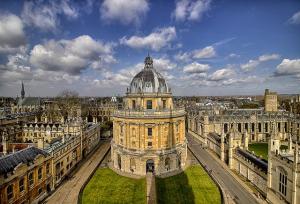 Over the last few days, I’ve been reading Oxford theologian Nigel Biggar’s interesting little book Between Kin and Cosmopolis: An Ethic of the Nation. What makes the book particularly compelling is the fact that it was written in 2014—years before the “populist turn” that launched the UK out of the European Union and put Donald Trump in the White House. Biggar’s volume is, at bottom, a Christian defense of the principles of liberal democracy—but those principles are not exactly conceived in American terms.
Over the last few days, I’ve been reading Oxford theologian Nigel Biggar’s interesting little book Between Kin and Cosmopolis: An Ethic of the Nation. What makes the book particularly compelling is the fact that it was written in 2014—years before the “populist turn” that launched the UK out of the European Union and put Donald Trump in the White House. Biggar’s volume is, at bottom, a Christian defense of the principles of liberal democracy—but those principles are not exactly conceived in American terms.
In particular, Biggar argues that one of the UK’s key political strengths is its establishment of the Church of England as its national church. First, he notes (correctly) that all political decisions are traceable back to first principles with profoundly theological implications, and that it is far better for a government to be transparent about that fact than to attempt to mask it in secular language. Second, drawing on substantial survey data, he points out that there is surprisingly little public opposition to this sort of low-octane establishment, and that members of minority religious groups are likely to find the state’s public embrace of religion—even a faith not their own—as far more reassuring than a state-enforced secularism (as in France). The net result of this dynamic, Biggar contends, is a polity steeped in latent faith that can properly ground any talk of human rights and values.
Now, there are plenty of other things that could be said about the strengths or weaknesses of this model—after all, UK citizens are not exactly packing the pews of England’s historic churches. But in the context of American political thought, it’s a fascinating issue to contemplate—primarily because, thanks to the First Amendment, no one’s ever put something similar on the table as an argumentative option.
Along these same lines, I’ve also been reading about the curious case of Félicité Lamennais, a French Catholic philosopher who argued simultaneously for ultramontanism—the principle that the Pope is absolutely supreme over church councils and temporal monarchs alike—and for a robust regime of civil liberties protections in any society governed by the Church. (His proposal was slapped down by Pope Gregory XVI’s 1832 encyclical Mirari vos.) This too strikes me as worthy of further investigation, primarily because it serves as proof-of-concept for a theologically informed “soft integralism”—an acknowledgment that the state may have a role to play in promoting moral virtue (and even advancing Catholicism!) but that the state ought not rule with a heavy hand.
For those who’ve been following the rift in American social conservatism for a while now (I hate to call the two camps the “French” and “Ahmari” factions, but there you have it), these sorts of political ideas are real category-scramblers. In particular, they allow two important, interrelated hypotheses to be posed:
- Maybe, contra the “French” camp, Thomas Jefferson’s “wall of separation” between church and state hasn’t turned out to be a good idea after all.
- Maybe, contra the “Ahmari” camp, it’s possible for a society to have a cohesive approach to politics and faith without reverting to a fully medieval vision.
Now, I’m certain that those in the Catholic integralist camp will write off this sort of talk as merely more “liberalism.” For a lot of folks who take the “liberalism is heresy” line, it’s obvious that the appeal of premodern politics is rooted in a general feeling of disgust with the perceived decadence of the contemporary world—and so it’s necessary to bring back the specific pattern of morals enforcement that prevailed during the Middle Ages. In other words, it’s either Pornhub or the Inquisition.
But obviously this is a false dilemma. Lurking beneath the surface of many debates over “liberalism” is some version of John Henry Newman’s adage that there is “no medium, in true philosophy, between Atheism and Catholicity”—or, in this context, that there’s no medium between nihilistic decadence and medieval totalitarianism. On this front, Biggar makes a particularly salient point that’s worth reproducing in full:
Even medieval Christendom—now a secularist byword for violent, authoritarian repression—allowed public space for disagreement and tolerated the expression of controversial views. If that were not so, then there would have been no scholastic disputations in the universities. The difference between pre-modern Christian societies and contemporary liberal ones is a matter of degree, not kind.
It’s worth pausing for a moment to let this insight sink in. The central questions of politics—including “how much freedom is too much freedom?”—simply can’t be written off as manifestations of “liberalism” or a denial that there is indeed a common good. Rather, they are baked into politics as such.
And this means that you can’t solve the problem of “people misusing their freedom” by reverting to a prior historical moment. As I’ve written before, the ideas that many intellectual historians associate with the rise of modernity—the “univocity of being,” nominalism, and so forth—arose in the context of scholastic disputations. It’s a common refrain among critics of “liberalism” that modern-day infringements on religious liberty and other cultural pathologies are simply the “unfolding of liberalism’s inner logic.” But historically speaking, one can make a good argument that secularization was actually the “unfolding of medieval society’s inner logic” since these metaphysical debates were permitted to occur within the Church. The point being, there was nothing magical about medieval political structure that could prevent the rise of modernity. (I also can’t resist noting that no less an authority than Thomas Aquinas thought it didn’t make sense for the civil government to ban prostitution. Tradeoffs between law and liberty are as old as time.)
This is why I increasingly think that it’s time for conservatives to stop arguing about the merits of “liberalism.” The concept is simply being used too amorphously for any real progress to be made. What is usually referred to by “liberalism,” in the context of current debates, is something along the lines of “secular humanitarianism”—which Daniel Mahoney has written about extensively—but “liberalism” is regularly used by its critics as a negative descriptor of any argument that makes reference to personal liberty or suggests that misuses of liberty are endemic to human society. Noted Christian philosopher Alvin Plantinga once quipped that the definition of “fundamentalist,” in functional terms, is “stupid sumbitch whose theological opinions are considerably to the right of mine.” At this point, “liberal” has regularly come to mean “stupid sumbitch whose political opinions are slightly to the left of mine.”
Unfortunately for everyone involved, most of the recent controversy along these lines has focused on a seemingly binary opposition between “liberalism” and “the common good.” That’s nonsense. All politics have a concept of the common good, whether or not they use those words. The libertarian who posits the Non-Aggression Principle as absolute has an idea of the common good. The progressive who builds her arguments around John Rawls’s “public reason” has an idea of the common good. The conservative who wants to “make America great again” has an idea of the common good. In fairness, this debate has gone on so long because of the presence of historically illiterate critics on the right who largely lack the vocabulary of classical political thought. But all of this should have fallen away with a very straightforward observation: all politics inevitably involves coercion at some point, and the criteria for determining morally just coercion reflect one’s understanding of the common good.
Liberalism, on this understanding, is a direction (toward less coercion), not a state of being. And so the questions of politics must focus on how much liberty a society can tolerate before it starts to break down.
This is a very old debate, of course. But it’s not a conversation that many critics of “liberalism” seem very interested in having. And that isn’t surprising, because it breaks down the binary good-versus-evil framing that their arguments rely on (and opens up the possibility of proposals like Biggar’s and Lamennais’s). Proposals like those, though, may be just what the conversation needs in order to move forward.












